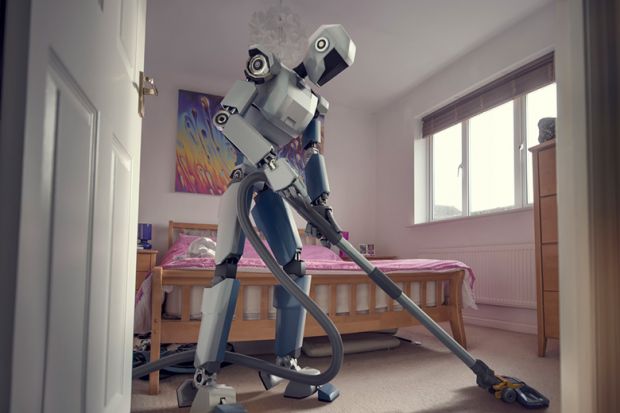Few technologies conjure up a wider, more colourful range of images than that of the robot. Whether the first picture that comes to mind is Robbie the Robot from Forbidden Planet, Marvin the Paranoid Android from The Hitchhiker’s Guide to the Galaxy or a droid from the Star Wars universe, the robot has formed a highly visual part of our fictional future for almost a century. Today, not for the first time, robots are being touted as the next fundamentally disruptive technology. With self-driving vehicles, smart homes and humanoid household helpers now high on the list of priorities for industry pundits and marketing folk, it is time to look in detail at the potential impacts of when fictional innovation becomes real.
Technical capability isn’t the only issue at stake if robots are going to become a permanent, visible part of human culture; there are some serious discussions to be had regarding the social, legal and moral status of autonomous systems. Enter our genial hosts Paul Dumouchel and Luisa Damiano, armed with the philosophical tools and arguments to help us place our new companions in a broader context. Structured and referenced rather like an extended review article, their book takes us on a detailed tour of the philosophy of artificial intelligence (AI) – especially as it applies to robots intended to build social relationships with humanity.
This is a work of serious scholarship, with arguments about identity, authority, autonomy and what is termed “artificial empathy” presented with reference to a range of example systems. Kant, Descartes, Hobbes and other philosophical heavyweights get the exposure you might expect, but when set alongside the views of such disparate players as psychologist Jean Piaget and science-fiction writer Algis Budrys the analysis offers considerable breadth. The initial scene-setting uses the familiar science-fiction narrative to engage the reader, but the text is deeply embedded in the real world – concluding with a discussion of the use of autonomous weapons in warfare, a topic sobering and terrifying in equal measure.
The ethical environment of organic and synthetic organisms – especially in combination – is amply covered, yet some critical questions remain. Who will these artificially intelligent devices be working for? If the “AI” consumer products now ingratiating their way into our homes are a model for the future, we may be faced with an environment in which the ethical stance applied to our companion devices is defined and managed by the handful of global corporations that will provide them. We may find that we have been sleepwalking into a world where the only loyalty shown by our robotic assistants is to their creators.
If we are to build a robust, appropriate ethical structure around the next generation of technical development – some combination of deep learning, artificial intelligence, robotics and artificial empathy – we need to understand that managing the impact of these technologies is far too important to be left to those who are enthusiastically engaged in producing them. This book is both a comprehensive, engaging review of philosophical thought and a warning to anyone who thinks that the integration of robotics into our society is about technology alone.
John Gilbey teaches in the department of computer science, Aberystwyth University.
Living with Robots
By Paul Dumouchel and Luisa Damiano; translated by Malcolm DeBevoise
Harvard University Press, 280pp, £23.95
ISBN 9780674971738
Published 24 November 2017
POSTSCRIPT:
Print headline: Thinking person’s guide to age of AI
Register to continue
Why register?
- Registration is free and only takes a moment
- Once registered, you can read 3 articles a month
- Sign up for our newsletter
Subscribe
Or subscribe for unlimited access to:
- Unlimited access to news, views, insights & reviews
- Digital editions
- Digital access to THE’s university and college rankings analysis
Already registered or a current subscriber? Login








